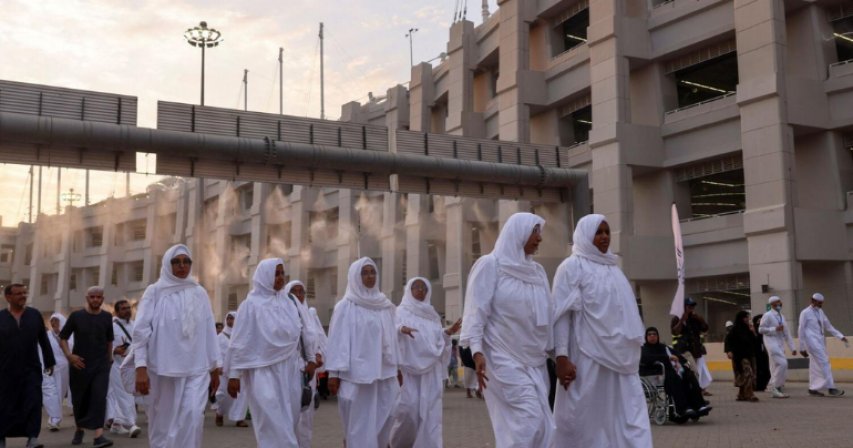Temperatures hit 51.8°C at Makkah's Grand Mosque as Haj ends

On Monday, Saudi Arabia issued a warning about an extreme temperature surge in Mecca as the annual Haj pilgrimage drew to a close under scorching conditions. The Saudi health ministry confirmed more than a dozen heat-related fatalities and over 2,700 cases of heat exhaustion recorded on Sunday alone.
This year, one of the world's largest religious gatherings occurred once again during the intense Saudi summer. The Saudi weather service reported that temperatures soared to 51.8 degrees Celsius (125 degrees Fahrenheit) at Mecca's Grand Mosque, where pilgrims were performing the Tawaf, circling the Kaaba, the central structure towards which all Muslims pray.
In nearby Mina, where pilgrims were engaging in the ritual of "stoning the devil" by throwing stones at three concrete walls, the temperature reached 46°C. This ritual is the final significant act of the Haj and took place under the relentless sun.
The extreme heat has led to several fatalities among pilgrims. Jordan's foreign ministry reported on Sunday that 14 Jordanian pilgrims had died from sunstroke due to the heat wave, with 17 others still missing. Iran reported five pilgrim deaths without specifying the cause, while Senegal's foreign ministry confirmed three fatalities. Additionally, an Indonesian health ministry official in Saudi Arabia stated that 136 Indonesian pilgrims had died during the Haj, including at least three from heat stroke.
The Saudi health ministry highlighted the unprecedented temperatures, advising pilgrims to avoid sun exposure. “The holy sites today record the highest temperatures since the beginning of Haj... that may reach 49 degrees Celsius, and we advise the guests of God not to be exposed to the sun," the ministry stated, according to state-affiliated Al-Ekhbariya channel.
Sunday's heat exhaustion cases were attributed to sun exposure and non-compliance with guidelines, which include staying sheltered during peak sun hours. The ministry emphasized prevention, urging pilgrims to use umbrellas, stay hydrated, and avoid the sun to reduce the risk of heat exhaustion.
The annual pilgrimage has increasingly felt the effects of climate change. A Saudi study published last month noted that regional temperatures have been rising by 0.4°C each decade, complicating the already challenging conditions of the Haj.
On Monday, Mina's pilgrims were seen pouring water over their heads, while authorities distributed cold drinks and ice cream to combat the heat. Azza Hamid Brahim, a 61-year-old pilgrim from Egypt, described the harrowing scene of motionless bodies along the roadside and overwhelmed ambulances. “The ambulances didn't know which way to turn. It looked like Judgement Day, the end of time," she said. "It was a really hard day. We said to ourselves: 'That's it, we're going to die' because of the heatwave."
Similarly, Arzu Farhaj from Pakistan recounted struggling to find help for a woman lying on the roadside. The woman appeared to be alone, and people were passing by without assisting her. Farhaj mentioned that she could not get security staff to call an ambulance.
The Haj, one of the five pillars of Islam, is a religious duty that all Muslims with the means must perform at least once. It follows the Islamic lunar calendar, shifting earlier each year in the Gregorian calendar. This year's Haj took place from June 14 to June 19, drawing approximately 1.8 million pilgrims, with 1.6 million from abroad, according to Saudi authorities.
Hosting the Haj is a significant source of prestige for the Saudi royal family. King Salman's title includes "Custodian of the Two Holy Mosques" in Mecca and Medina. Crown Prince Mohammed bin Salman reiterated on Sunday the kingdom's commitment to providing all necessary services to ensure the safety and security of the pilgrims.
The Saudi health ministry pledged to closely monitor cases of heat exhaustion and ensure that pilgrims can complete their Haj journey in good health. "Our health guidelines for the coming days are clear and easy: carry an umbrella, drink water regularly, and avoid exposure to the sun," the ministry advised, emphasizing the importance of preventive measures to safeguard the well-being of the pilgrims.
By: Sahiba Suri





Comments